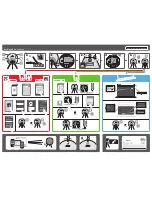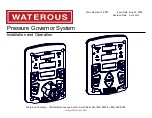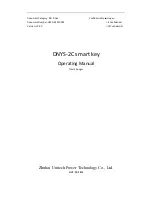
Impedance respiration
Respiration measurement description
When starting respiration monitoring, the system “learns” the patient’s respiration
pattern. The respiration rate is calculated from impedance changes and a respiration
waveform is displayed.
Respiration measurement with PSM
With impedance respiration
Sensitivity
set to
AUTO
, two breaths are averaged and
the average amplitude of the respiration waveform is found. Detection sensitivity
is automatically set at one half of the average amplitude. Sensitivity dotted lines
displayed on the waveform show the minimum detection range which is 25%. The
percentage is the ratio to the reference bar on the left in the waveform display, which
corresponds to 100%.The user can manually set the impedance respiration
Sensitivity
to
20%
,
40%
,
60%
,
80%
, or
100%
and the sensitivity dotted lines displayed on the
waveform will show the selected detection range. The percentage is shown with a
reference bar that corresponds to 100%, meaning that the
100%
selection uses the
whole drawing area. The bar is on the left in the waveform display.
Respiration measurement with PDM and TRAM
Eight breaths are averaged and the average amplitude of the respiration waveform
is found. Detection sensitivity is automatically set at 40% of the average amplitude.
Sensitivity dotted lines displayed on the waveform show this 40% detection range.
Once learning is complete, the user can adjust the detection sensitivity to 10, 20,
30, 40, 50, 60, 70, 80, or 90%.
How to interpret the respiration values
The following is an example of a regular and even respiratory waveform, with the
inspiration and expiration markers identified (1 = inspiration marker, 2 = expiration
marker).
Respiration troubleshooting
Problem
Solution
What can I do if the respiration measurement fails?
●
Check electrode quality and positioning.
●
Adjust the breath detection sensitivity. During
ventilator-supported breathing, the respiration
calculation may count only ventilator-produced
inspirations and expirations.
2062971-001
CARESCAPE Modular Monitors
199
Summary of Contents for CARESCAPE
Page 38: ...38 CARESCAPE Modular Monitors 2062971 001 ...
Page 114: ...Setting up the monitor before use 114 CARESCAPE Modular Monitors 2062971 001 ...
Page 146: ...Alarms 146 CARESCAPE Modular Monitors 2062971 001 ...
Page 218: ...Pulse oximetry 218 CARESCAPE Modular Monitors 2062971 001 ...
Page 234: ...Non invasive blood pressure 234 CARESCAPE Modular Monitors 2062971 001 ...
Page 260: ...Temperature 260 CARESCAPE Modular Monitors 2062971 001 ...
Page 274: ...Cardiac output 274 CARESCAPE Modular Monitors 2062971 001 ...
Page 280: ...Mixed venous oxygen saturation SvO 280 CARESCAPE Modular Monitors 2062971 001 ...
Page 338: ...Patient Spirometry 338 CARESCAPE Modular Monitors 2062971 001 ...
Page 372: ...Neuromuscular transmission 372 CARESCAPE Modular Monitors 2062971 001 ...
Page 404: ...Laboratory data 404 CARESCAPE Modular Monitors 2062971 001 ...
Page 410: ...Calculations 410 CARESCAPE Modular Monitors 2062971 001 ...
Page 416: ...Drug calculations 416 CARESCAPE Modular Monitors 2062971 001 ...
Page 424: ...Trends 424 CARESCAPE Modular Monitors 2062971 001 ...
Page 432: ...Snapshots and events 432 CARESCAPE Modular Monitors 2062971 001 ...
Page 462: ...Cleaning and care 462 CARESCAPE Modular Monitors 2062971 001 ...
Page 528: ...Abbreviations yr year yrs years 528 CARESCAPE Modular Monitors 2062971 001 ...
Page 546: ...Skills checklist 546 CARESCAPE Modular Monitors 2062971 001 ...
Page 547: ...content ...
















































